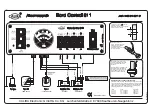
Page 18
Section E
Description
The engine is water cooled, assisted by a fan. The system is of the
positive circulation type, incorporating a centrifugal water pump
driven by a "V" belt from the crankshaft pulley. The fan is mounted on
a pulley pressed on to the front of the water pump spindle. To
pressurise the system and raise the boiling point of the coolant, the
radiator filler cap has a spring loaded valve set to open at 0.28 kg/cm²
(4.0 lb/in²)
A wax type thermostat in conjunction with a by pass hose assists rapid
warming up and maintains a constant operating temperature.
The water temperature is indicated by a meter, housed in the left-
hand gauge of the fascia. This is measured electrically by a
temperature sensitive sender unit screwed in to the thermostat
housing.
Routine maintenance
The coolant level should be regularly checked and topped up if
necessary. Check the cooling system periodically for leaks and ensure
the fan belt is correctly adjusted.
Anti-freeze mixture
In the winter months an anti-freeze must be added to the coolant in
the radiator to prevent damage to the cylinder block or radiator
caused by freezing.
Before refilling, the cooling system should be flushed out thoroughly.
Check the condition of all hoses and connections in the cooling and
heater systems.
It is advisable to pre-mix the anti-freeze with water in a separate
container before refilling the cooling system.
The percentage of anti-freeze solution in the cooling system will
determine the degree of protection and it is advisable to allow a
margin of safety in cases where lower temperatures than normal may
be encountered.
The quantities of anti-freeze for various degrees of protection are
given in a table at the end of this section.
The percentage of anti-freeze in the cooling system can be checked by
measuring the specific gravity of the coolant using a suitable
hydrometer.
It is permissible with modern anti-freeze formulation to leave the anti-
freeze solution in the cooling system throughout the year, provided
that the protection afforded at the onset of Winter has not been
reduced by routine topping up of the coolant water during the
summer months.
Note:
During summer months, if no anti-freeze is used a solution of
water plus 3.35 fluid oz of Reliant Coolant Inhibitor "R" part number
10374
MUST
be used to maintain the system free of corrosion.
Operation 1 Draining the cooling system
Drain plugs are provided, one on the left hand side of the cylinder
block (Figure 1) and one in the base of the radiator (Figure 2 & 3).
Cooling system
Some vehicles may have a radiator without a drain plug fitted. To
drain the radiator on this type the bottom hose must be removed.
The vehicle should be standing on level ground with the radiator filler
cap removed when draining.
Note:
Do not remove the radiator cap when the engine is hot as this
will cause very hot water and steam to be blown out of the filler neck
possibly leading to injury from scalding.
If anti-freeze is being used it is advised that the coolant be collected in
a clean container beneath the vehicle and retained for re-use.
Drain the cooling system and flush through by inserting a hose pipe in
the radiator filler orifice and allowing water to flow through the
system until clean.
Note
: It is advisable to leave an indication within the vehicle that the
cooling system has been drained .
Figure 1 Cylinder block drain plug
To refill
Replace drain plugs (refit bottom hose if removed).
If anti-freeze solution has been retained, return it to the cooling
system. If the liquid retained is not sufficient to fill the system, add
additional anti-freeze solution as required. Do not top up with only
water, otherwise the solution may be weakened making it less
effective in adverse conditions.
Do not over fill the radiator. The correct level of the coolant in the
radiator is reached when the top header tank is approximately two
thirds full. Some vehicles may have a radiator with a coolant level
indicator, visible in the filler neck.
Summary of Contents for Rebel 700 1967
Page 8: ...Page 8 Section A Chassis Frame ...
Page 9: ...Page 9 ...
Page 14: ...Page 14 ...
Page 19: ...Page 19 ...
Page 24: ...Page 24 Section F Engine ...
Page 41: ...Page 41 Section G Early Models prior to Chassis No 941001 3 Synchro Gearbox ...
Page 43: ...Page 43 ...
Page 47: ...Page 47 ...
Page 52: ...Page 52 ...
Page 55: ...Page 55 ...
Page 57: ...Page 57 Section K Rear Axle ...
Page 68: ...Page 68 ...
Page 72: ...Page 72 Section P Fuel System ...
Page 75: ...Page 75 ...
Page 84: ...Page 84 ...
Page 85: ...Page 85 ...
Page 89: ...Page 89 Section R Interior ...
Page 94: ...Page 94 ...
Page 95: ...Page 95 ...
Page 105: ...Page 105 ...
Page 107: ...Page 107 ...
Page 109: ...Page 109 ...
Page 110: ...Page 110 ...
Page 112: ...Page 112 ...
Page 113: ...Page 113 ...
















































